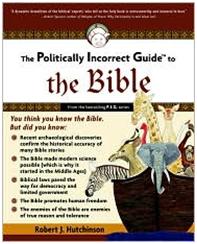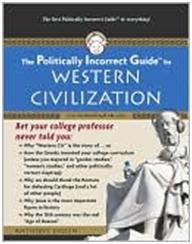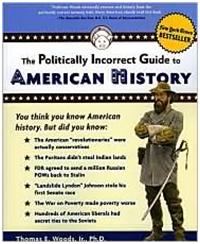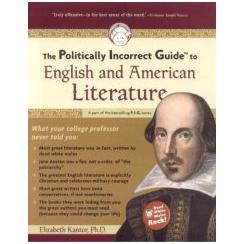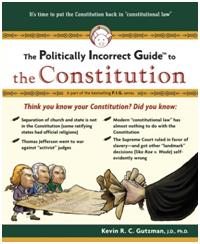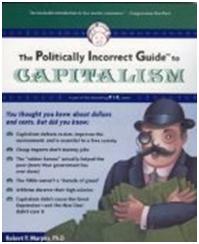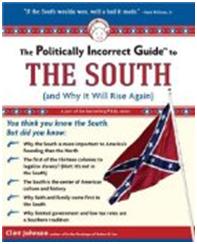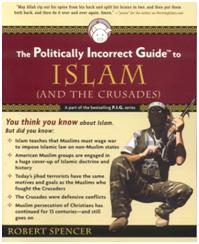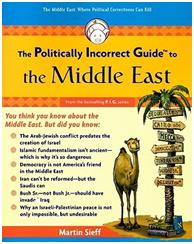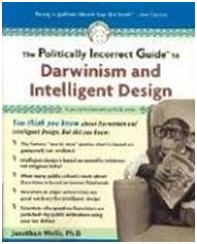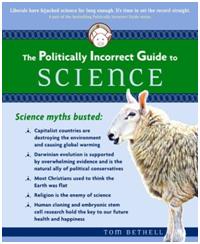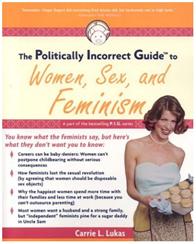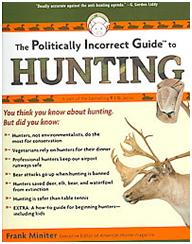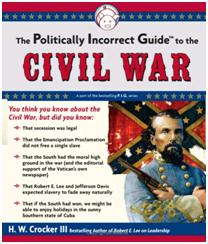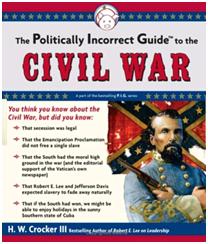 Just published – The Politically Incorrect Guide to the Civil War! This is a worthy addition to the Politically Incorrect Guides. I’ve previously reviewed the Politically Incorrect Guide to Western Civilization, and the Politically Incorrect Guide to English and American Literature.
Just published – The Politically Incorrect Guide to the Civil War! This is a worthy addition to the Politically Incorrect Guides. I’ve previously reviewed the Politically Incorrect Guide to Western Civilization, and the Politically Incorrect Guide to English and American Literature.
First, a few caveats. Neither the book (nor this post) is an apology for or a defense of slavery. I believe slavery to have been a great moral evil – and I wish it had been ended in this country earlier and with less bloodshed. But there is much more to the Civil War than simply the question of whether slavery was evil and should be abolished.
Crocker deals directly with the topic of slavery early in the book in a 12-page essay in answer to the question, “Was the war really all about slavery?”
The first sentence of his answer is, “In the sense that the South was defined by slavery, yes.” He then proceeds to qualify that answer and show that the issue is far more complex than the politically correct answer.
As an example, he quotes a famous letter from Abraham Lincoln to Horace Greely in August 1862, in which he stated: “My paramount object in this struggle is to save the Union, and is not either to save or to destroy slavery. If I could save the Union without freeing any slave I would do it, and if I could save it by freeing all the slaves I would do it; and if I could save it by freeing some and leaving others also I would also do that.”
As Mr. Crocker observes, “. . . the stated aim of the Lincoln administration in 1861 was not the abolition of slavery; it was the forcible reunification of the Union.”
Both Jefferson Davis (President of the Confederate States) and Robert E. Lee believed that the abolition of slavery was something that would happen peaceably in due course. Lee’s opinion was that “emancipation will sooner result from the mild and melting influence of Christianity than from the storms and contests of fiery controversy.”
Crocker’s summarizes the conflict as a clash of cultures:
“The South considered the North an unprincipled money-grubbing, self-righteously intolerant leviathan, and thought of itself as a liberty-loving agricultural Sparta of gracious gentlemen, classical culture, and feudal order.
The North considered the South a backward land of hot-tempered planter-aristocrats who kept a booted heel and a master’s whip on the backs of slaves, tainted the Union with its “peculiar institution,” and dragged it into wars against Mexico only to expand its hateful “slave power.” The North, in its own view, was enlightened, practical and business-like, and consequently wealthy, forward-looking, and the obvious moral superior to a region that kept imported Africans in bondage.”
As Crocker shows, each side tended to caricature the other – which only underscores that the conflict (although it involved slavery as a central issue) was about much more than slavery. Crocker argues, convincingly, that the war was fought, not to free the slaves (though in the end, it resulted in their freedom), but to forcibly prevent the Southern states from peaceably seceding.
The majority of the book is not about why the war was fought, but devoted to retelling the course of the war from the Southern perspective. There are two chapters which tell The History of the War in Sixteen Battles You Should Know. These are well worth the read.
This is followed by nine chapters which are admirable biographies of the leading generals on both sides. Southern generals sketched are Robert E. Lee, James Longstreet, Nathan Bedford Forrest, Stonewall Jackson, and A.P. Hill. But there are also chapter length biographies of the Union generals George H. Thomas (introduced with the wry comment that “some of the best Union generals were southerners”), William Tecumseh Sherman, Ulysses S. Grant, and George McClellan.
Part IV of the book is a fascinating study of cavalry officers Wade Hampton, Philip Sheridan, J.E.B. Stuart and George Armstrong Custer.
Part V, titled Beating Retreat is an extended essay on the topic, What If the South Had Won? Crocker composes a remarkable speech that Lincoln might have given, but tragically didn’t, that begins:
We part as friends. We hope to reunite as friends. There will be no coercion of the Southern states by the people of the North. No state shall be kept in the Union against its will . . . but we ask the Southern states, to which we are bound by mystic chords of memory and affection, that they reconsider their action., If not now, then later, when the heat of anger has subsided, when they have seen the actions of this administration work only for the good of the whole and not for the partisan designs of a few; when this administration shows by word and deed that it is happy to live within the confines of the Constitution, that we will admit of no interference in the stabled institutions of the several states. I trust that by our demeanor, by our character, by our actions, by our prosperity and our progress we will prove to our separated brethren that we should again be more than neighbors, we should be more than friends, we should in fact be united states, for a house united is far stronger, will be far more prosperous, and will be far happier than a house divided, a house rent asunder by rancor, a house that undermines its very foundations by separation.
To the people of Maryland, Virginia, Delaware, Kentucky, Missouri, Tennessee, and Arkansas, I have a special message. I tell you that this government will raise no arms against the states of the Southern Confederacy. We will wage no war of subjugation against these states. And I confirm, yet again, that I have neither the right, nor the power, nor the desire to abolish slavery within these states or any other where it is lawfully established. What I do desire, as do all Northern states, is that we be once again a nation united in peace, amity, and common government. Let us through prayer and good graces work to achieve that end. I ask that all good men of the United States, and those now separated from us, work peaceably to achieve the reconciliation that is our destiny and our hope. Four score years ago we created a new nation, united in principle. I pray that sharing the same God, the same continent, and the same destiny, we might unite again in common principle and common government.”
If Lincoln had not gone to war to keep the Southern states from seceding, would they have one day returned and reunited with the Union peaceably? We will never know. We do know what waging war to prevent secession cost – and it was far more than Lincoln, or anyone else, expected.
Included as an Afterword to this volume is an essay by Jefferson Davis which he composed for his own history of the Confederacy. It is worth reading if one wants to understand what motivated the Southern states to secede and to fight for their independence.
The Politically Incorrect Guides are intended for college students as a balance and useful corrective to the usual bill of fare in politically correct textbooks, but they could be profitably read by high school students who are studying this important period of history. This Guide will also serve as a thought-provoking read for parents and all those interested in better understanding what is still one of the central facts of the history of the United States, the Civil War.
The Politically Incorrect Guide to the Civil War is a paperback, 370 pages. Like all of the Politically Incorrect Guides, it sells for $19.95 and may be ordered directly from Greenleaf Press by clicking on the links in this message.
– Rob Shearer
Publisher, Greenleaf Press
Director, Schaeffer Study Center
There are a number of other Politically Incorrect Guides. They are well-written, well-researched, and well documented. Each serves as a useful corrective to the overwhelming cultural bias that our current textbooks suffer from. We’ve decided at Greenleaf to carry them all. Here are all 15 of the titles:
Or you can order the Complete Politically Correct Library – all 15 titles – for $250 – a 16% discount (that’s like getting two books free!)
